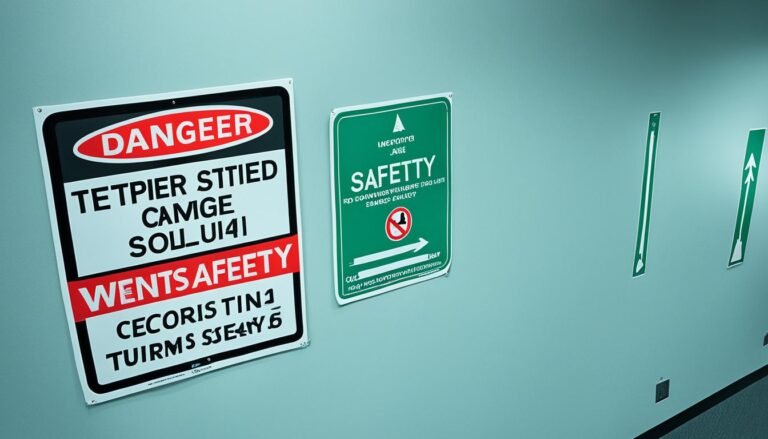A Guide to Human Resources Conflict Mediation
Workplace conflict resolution is a crucial task for HR professionals. Conflict can have a significant impact on employee engagement, retention, and overall work culture. This chapter explores effective conflict resolution strategies for HR, including prevention, mediation, and training. By implementing these strategies, HR can create a healthier and more productive work environment.
Key Takeaways:
- Workplace conflict can disrupt productivity and harm employee relationships.
- HR should intervene when conflicts negatively affect the work environment.
- HR plays a vital role in mediating and resolving conflicts.
- Effective conflict resolution strategies include open communication and mediation.
- Prevention is key in conflict management, and HR can take proactive measures.
Understanding Workplace Conflict
Workplace conflict is a common occurrence that can disrupt productivity and harm employee relationships. As HR professionals, it is crucial to distinguish between a simple disagreement and a full-blown conflict. While disagreements can be healthy and lead to innovation, conflicts involve personal attacks, rudeness, or resentment, and they have a negative impact on the work environment.
In order to effectively manage workplace conflicts, HR professionals need to intervene when conflicts arise and negatively affect the work environment. By proactively addressing conflicts, HR can prevent further escalation and facilitate a resolution that benefits all parties involved.
It is important to understand the different types of workplace conflicts that can occur. These conflicts can be categorized into various areas, such as:
- Interpersonal conflicts between individuals
- Conflict between teams or departments
- Conflicts arising from differences in work styles or values
- Conflicts related to significant organizational changes
Having a clear understanding of the root causes and dynamics of workplace conflicts enables HR professionals to develop effective conflict management strategies. By implementing appropriate conflict resolution techniques, HR can foster a positive work environment and maintain healthy employee relationships.
Recognizing Workplace Conflict
Recognizing workplace conflict is the first step towards managing it effectively. Some common signs of workplace conflict include:
- Increased tension and hostility between individuals or groups
- Decreased productivity and engagement levels
- Frequent arguments, complaints, or negative feedback
- High employee turnover rates
By staying alert to these signs, HR professionals can address conflicts in their early stages, minimizing their impact on the work environment and preventing further damage.
“Identifying workplace conflict and taking appropriate action at the right time is crucial for maintaining a positive and harmonious work environment.”
Conflict Management Strategies
When it comes to managing workplace conflicts, HR professionals can employ a variety of conflict management strategies. These strategies aim to resolve conflicts and restore a productive work environment. Some effective conflict management strategies include:
- Open communication and active listening: Encouraging individuals to express their concerns and actively listening to all parties involved can help identify the underlying issues causing the conflict. This promotes understanding and paves the way for a resolution.
- Mediation and facilitation: Engaging impartial mediators to facilitate open dialogue and guide the conflicting parties towards finding common ground and reaching mutually acceptable resolutions.
- Conflict resolution training: Providing conflict resolution training to employees equips them with essential skills like communication, problem-solving, and negotiation. This empowers employees to manage conflicts effectively on their own and reduces the need for external intervention.
- Establishing clear policies and procedures: Having well-defined conflict resolution policies and procedures in place ensures consistency and fairness. These policies should outline steps for reporting and resolving conflicts, promoting transparency and accountability.
By implementing these conflict management strategies, HR professionals can effectively mitigate workplace conflicts and create a harmonious work environment where employees can thrive.
The Role of HR in Conflict Resolution
HR professionals play a vital role in mediating and resolving workplace conflicts. By applying their expertise and skills, they have the power to foster a harmonious and productive work environment. The role of HR in conflict resolution goes beyond simply addressing issues; it involves facilitating healthy and effective conversations between conflicting parties.
HR professionals should:
- Act as a mediator, providing a neutral and objective perspective
- Identify the root cause of conflicts to implement appropriate resolution strategies
- Create a safe space for open dialogue, allowing parties to express their concerns
HR professionals have the opportunity to bring conflicting parties together, encouraging them to understand each other’s perspectives and find common ground. By taking on the role of mediator, HR professionals can guide employees towards mutually beneficial resolutions.
Mediation in the workplace involves:
- Actively listening to both parties to understand their viewpoints
- Helping them communicate effectively and respectfully
- Encouraging problem-solving and compromise
- Clarifying misunderstandings and finding areas of agreement
This mediation process creates an environment that promotes healing, collaboration, and growth. HR professionals equipped with strong mediation skills can navigate conflicts and ultimately contribute to a healthier work culture.
By embracing the role of mediator, HR professionals encourage open dialogue, promote positive relationships, and ensure conflicts are resolved in a fair and timely manner. Their involvement is crucial in maintaining a productive and respectful work environment, fostering employee engagement, and overall organizational success.
Conflict Resolution Strategies
Facilitating effective conflict resolution is a critical skill for HR professionals. By employing appropriate conflict resolution strategies, HR can help create a harmonious work environment that encourages collaboration and productivity.
Promoting Open Communication
Open communication is essential in resolving conflicts. Encouraging employees to express themselves and actively listen to each other fosters understanding and empathy. HR can establish channels for open dialogue, such as regular team meetings or suggestion boxes, where employees can voice their concerns and opinions.
Developing a Comprehensive Conflict Resolution Policy
A well-defined conflict resolution policy sets clear guidelines for addressing conflicts and ensuring fairness. HR should develop a policy that outlines steps to be followed, including reporting procedures, investigation processes, and the use of mediation or facilitation if necessary. This policy should be communicated to all employees to promote transparency and consistency.
Providing Conflict Resolution Training
Equipping employees with conflict resolution skills is crucial for effective conflict management. HR should provide comprehensive conflict resolution training that covers active listening, effective communication, negotiation techniques, and problem-solving strategies. Training programs can be conducted through workshops, seminars, or online courses to ensure widespread knowledge and application.
Utilizing Mediation and Facilitation
Mediation and facilitation are valuable techniques for resolving conflicts. HR can engage professional mediators or internal facilitators to help parties involved in a conflict reach a mutually acceptable resolution. Mediators provide a neutral and unbiased perspective, guide structured dialogue, and foster collaboration, ensuring a fair and balanced process.
Implementing these conflict resolution strategies empowers HR professionals to address conflicts effectively, improve employee relationships, and maintain a positive work environment.
| Conflict Resolution Strategies | Benefits |
|---|---|
| Promoting open communication | – Fosters understanding and empathy among employees – Encourages collaboration and teamwork |
| Developing a comprehensive conflict resolution policy | – Sets clear guidelines for addressing conflicts – Ensures fairness and transparency in conflict resolution processes |
| Providing conflict resolution training | – Equips employees with essential conflict resolution skills – Promotes effective communication and problem-solving |
| Utilizing mediation and facilitation | – Provides a neutral and unbiased approach to conflict resolution – Helps parties reach mutually acceptable resolutions |
Proactive Conflict Prevention
Prevention is key in effective conflict management. By proactively taking measures to prevent conflicts, HR professionals can foster a positive work culture and minimize the likelihood of potential issues arising. Promoting teamwork, collaboration, and respect among employees is crucial in creating a harmonious work environment.
Implementing team-building activities is one way to build strong relationships and enhance collaboration among team members. These activities can include workshops, retreats, or group exercises that encourage communication and cooperation. They help employees develop better understanding and empathy towards each other, reducing the chances of conflicts.
In addition, cross-departmental collaboration initiatives can play a vital role in conflict prevention. Encouraging employees from different departments to work together on projects and share ideas promotes a sense of unity and shared goals. When individuals from various teams collaborate, it enhances mutual understanding and reduces potential misunderstandings that could lead to conflicts.
“Teamwork is the ability to work together toward a common vision. The ability to direct individual accomplishments toward organizational objectives. It is the fuel that allows common people to attain uncommon results.” – Andrew Carnegie
A positive work culture is also essential in preventing conflicts. HR professionals should strive to foster an environment where employees feel valued, heard, and respected. When employees are happy and satisfied in their workplace, conflicts are less likely to arise. Advocating for open communication, recognition programs, and employee well-being initiatives can contribute to creating a positive work culture.
Fostering a Positive Work Culture
- Promote open communication and transparency throughout the organization.
- Encourage collaboration and cooperation among employees.
- Recognize and reward employee achievements and contributions.
- Support work-life balance and employee well-being initiatives.
- Provide opportunities for professional development and growth.
By fostering a positive work culture, HR professionals can create a foundation of mutual understanding and trust, which serves as a strong defense against conflicts. When employees feel supported and valued, they are more likely to address issues in a constructive manner, leading to better conflict resolution outcomes.
Training and Development
Investing in comprehensive conflict resolution training is essential for HR professionals to effectively address workplace conflicts. By equipping employees with the necessary skills and techniques, organizations can foster a culture of constructive dialogue and promote harmonious workplace relationships.
Conflict resolution training programs can take various forms, including workshops, seminars, and online courses. These programs focus on enhancing communication skills, active listening, negotiation, and problem-solving abilities. Through interactive training sessions, employees learn how to manage conflicts in a productive and respectful manner.
“Effective communication is at the heart of conflict resolution. Training employees on communication skills empowers them to express their thoughts and concerns effectively, leading to better understanding and resolution of conflicts.”
By participating in conflict resolution training, employees gain valuable insights into their own communication styles and learn techniques to de-escalate situations. They develop the ability to empathize with others, understand diverse perspectives, and find common ground for resolution.
Employers can collaborate with professional trainers or utilize internal HR resources to deliver conflict resolution training programs. These programs can be tailored to address specific workplace dynamics and challenges. By investing in employee development, organizations demonstrate their commitment to creating a positive and supportive work environment.
Promoting Employee Development Programs
In addition to conflict resolution training, organizations can implement broader employee development programs to enhance overall skills and competencies. These programs contribute to employee growth, productivity, and job satisfaction.
Employee development programs may include:
- Leadership development programs
- Technical skills training
- Management training
- Cross-functional training
By offering diverse development opportunities, organizations encourage continuous learning and career progression. Employees who feel supported and valued are more likely to engage in constructive conflict resolution and contribute to a positive work culture.
| Benefits of Conflict Resolution Training and Employee Development Programs |
|---|
| Enhanced communication skills |
| Improved conflict resolution abilities |
| Increased employee engagement and job satisfaction |
| Strengthened relationships within the workplace |
| Reduced workplace stress and tension |
The Importance of Mediation
Mediation is a powerful tool in resolving workplace conflicts. When conflicts arise, HR professionals can engage the expertise of professional mediators to assist in impartially resolving disputes. Professional mediators are trained to guide employees through structured mediation sessions, facilitating open dialogue and active listening. This process helps them explore underlying issues and work towards mutually acceptable resolutions. Mediation is particularly effective in situations where emotions are high, communication has broken down, or parties struggle to find common ground.
“Mediation provides a safe space for parties to express their concerns, clarify misunderstandings, and collaboratively find solutions. It allows individuals to be actively involved in the resolution process, which increases the likelihood of long-term agreement and positive relationships.”
By utilizing workplace mediation, organizations can benefit from the expertise of trained mediators who can impartially facilitate the resolution process. This helps ensure a fair and objective approach to resolving conflicts. Mediation also saves time and resources by offering a quicker resolution compared to formal grievance procedures or legal action.
Furthermore, mediation fosters a culture of open communication and conflict resolution within the workplace. Employees witness the effectiveness of mediation in addressing conflicts and may adopt similar approaches on their own. This helps create a harmonious work environment where individuals actively engage in resolving disagreements, leading to improved collaboration and productivity.
Key Benefits of Workplace Mediation:
- Impartial guidance from professional mediators
- Faster conflict resolution compared to formal procedures
- Cost-effective alternative to legal action
- Promotes open communication and collaboration
- Fosters a positive work culture
The following table highlights the key differences between workplace mediation and other conflict resolution methods:
| Workplace Mediation | Formal Grievance Procedures | Legal Action |
|---|---|---|
| Impartial third-party facilitation | Internal investigation with potential biases | Adversarial process with winner/loser outcome |
| Focus on reaching mutually acceptable resolutions | Focus on establishing fault or guilt | Focus on proving legal claims and seeking compensation |
| Promotes open dialogue and collaboration | Can create a tense and adversarial atmosphere | Formal court procedures with limited communication |
By recognizing the importance of mediation and incorporating it into their conflict resolution strategies, HR professionals can effectively address workplace conflicts and create a positive and productive work environment for all employees.
Developing Conflict Resolution Policies
Conflict resolution policies play a vital role in promoting a fair and transparent workplace. HR professionals have a responsibility to develop clear and effective policies that outline the steps involved in resolving conflicts and ensuring a positive work environment for all employees.
These policies should include:
- Reporting procedures: Clearly define how employees should report conflicts, whether through a designated HR representative, an anonymous reporting system, or any other established channels.
- Investigation processes: Outline how conflicts will be investigated, emphasizing the importance of confidentiality and impartiality in gathering information and reaching a resolution.
- Mediation: Highlight the availability of mediation as a resolution option, emphasizing its effectiveness in resolving conflicts through open dialogue and an unbiased mediator’s guidance.
- Disciplinary actions: Clearly state the potential consequences for unresolved conflicts or any further misconduct following a conflict resolution process, ensuring employees understand the importance of accountability and promoting a productive work environment.
By clearly communicating these policies to all employees, HR professionals promote transparency and foster trust within the organization. Employees can feel assured that conflicts will be handled fairly and objectively, encouraging them to come forward and engage in the resolution process.
Continuous Evaluation and Improvement
Effective conflict resolution strategies require ongoing evaluation and improvement to stay relevant and impactful. HR professionals should continuously monitor and assess the effectiveness of their conflict resolution strategies in order to identify areas for improvement and ensure that the strategies align with evolving needs and challenges within the organization.
One valuable way for HR to evaluate the effectiveness of conflict resolution strategies is to gather feedback from employees. By soliciting feedback, HR can gain valuable insights into the experiences and perceptions of employees regarding the effectiveness of the implemented strategies. This feedback can help identify areas where the strategies may need adjustment or improvement.
Additionally, conducting regular conflict resolution assessments is crucial for evaluating the overall effectiveness of the strategies. These assessments can involve reviewing key performance indicators related to conflict resolution, such as the number of successfully resolved conflicts, the time taken to resolve conflicts, and employee satisfaction with the resolution process.
By monitoring the effectiveness of the implemented strategies and gathering feedback, HR professionals can identify patterns, trends, and areas for improvement. This information can then be used to make data-driven decisions and continuously improve the conflict resolution strategies.
Benefits of Continuous Evaluation and Improvement
Continuous evaluation and improvement of conflict resolution strategies offer several benefits for organizations:
- Enhanced effectiveness: Regular evaluation ensures that conflict resolution strategies remain effective and aligned with the organization’s needs.
- Increased employee satisfaction: Gathering feedback from employees shows a commitment to their well-being and fosters a sense of inclusivity and trust.
- Improved workplace culture: Continuous improvement efforts demonstrate a proactive approach to resolving conflicts and promote a culture of open communication and continuous learning.
- Higher productivity: By identifying and addressing conflict resolution challenges, organizations can minimize disruptions and create a more productive work environment.
Ultimately, continuous evaluation and improvement of conflict resolution strategies allow HR professionals to adapt and refine their approaches for maximum effectiveness, resulting in a healthier and more harmonious work environment.
Ensuring Legal Compliance
When it comes to conflict resolution in the workplace, HR professionals must not only focus on effective mediation and resolution strategies but also ensure legal compliance. Understanding the legal aspects of conflict resolution is crucial to avoid potential legal pitfalls and protect the interests of both employees and the organization.
HR professionals should have a deep understanding of relevant workplace conflict laws and regulations. These laws may vary depending on the industry, jurisdiction, and specific circumstances. By staying updated on the latest legal developments, HR can ensure that the organization’s conflict resolution practices align with legal requirements.
When conflicts escalate and legal action becomes necessary, HR professionals play a crucial role in handling such situations appropriately. In these cases, involving external resources, such as legal experts or conflict resolution specialists, can provide valuable guidance and support.
“In complex conflict cases where legal compliance is involved, it is essential to seek external expertise. Legal experts can help interpret and navigate intricate legal frameworks, ensuring fair and lawful conflict resolution.” – Maria Rodriguez, Employment Law Attorney
By involving external resources, HR professionals can access specialized knowledge and expertise to effectively address conflicts within a legal framework. These experts can provide guidance on legal rights, obligations, and potential risks, helping HR make informed decisions.
Furthermore, external resources can assist in developing conflict resolution policies that align with legal requirements. These policies should clearly outline reporting procedures, investigation processes, disciplinary actions, and any other relevant steps involved in resolving conflicts while ensuring adherence to workplace conflict laws.
Benefits of Involving External Resources:
- Expertise in interpreting workplace conflict laws and regulations.
- Guidance on legal rights, obligations, and potential risks.
- Assistance in developing conflict resolution policies that align with legal requirements.
- Protection against potential legal pitfalls and liabilities.
It is important to note that HR professionals should only seek external resources when necessary, as they are primarily responsible for resolving conflicts internally. However, for complex cases or situations that require legal expertise, involving external resources ensures that conflict resolution efforts are carried out in a legally compliant and fair manner.
| Key Considerations for Ensuring Legal Compliance | Benefits |
|---|---|
| Stay updated on workplace conflict laws and regulations. | Compliance with legal requirements and avoidance of potential legal risks. |
| Involve legal experts or conflict resolution specialists when conflicts require legal action. | Expert guidance and support in navigating complex legal frameworks. |
| Develop clear conflict resolution policies that align with workplace conflict laws. | Transparency, fairness, and protection for both employees and the organization. |
By prioritizing legal compliance in conflict resolution efforts, HR professionals can ensure fair and lawful outcomes while safeguarding the organization from potential legal repercussions. A comprehensive understanding of workplace conflict laws and involving external resources when necessary will contribute to the effective and ethical management of conflicts in the workplace.
Conclusion
Effective conflict resolution is essential in the field of Human Resources. By implementing strategies that focus on open communication, conflict resolution training, mediation, and proactive prevention, HR professionals can create a harmonious work environment. These strategies enable HR to address conflicts promptly and effectively, promoting a positive, productive, and healthy work culture.
Continuous evaluation and improvement are crucial for successful conflict resolution efforts. Regular feedback collection and assessments allow HR to identify areas for enhancement and adapt their practices accordingly. By staying proactive and responsive, HR professionals can continuously refine their conflict resolution strategies and ensure they remain relevant and effective.
Legal compliance is also an important aspect of conflict resolution in the workplace. HR professionals must stay informed about relevant laws and regulations, ensuring that the organization’s practices align with them. In situations where conflicts require legal action, HR should involve external resources such as legal experts or conflict resolution specialists to handle the proceedings appropriately.
By integrating these conflict resolution strategies, conducting ongoing evaluation and improvement, and ensuring legal compliance, HR can effectively manage and navigate workplace conflicts. This not only resolves individual disputes but also cultivates a culture of understanding, respect, and collaboration among employees, ultimately fostering a positive and productive work environment.







